
Revista Colombiana de Filosofia de la Ciencia
Scope & Guideline
Fostering Open Access to Philosophical Insights
Introduction
Aims and Scopes
- Interdisciplinary Examination of Science and Philosophy:
The journal focuses on the philosophical underpinnings of scientific concepts, encouraging interdisciplinary approaches that integrate insights from various scientific disciplines with philosophical inquiry. - Critical Epistemological Analysis:
A significant emphasis is placed on epistemology, where papers often scrutinize the foundations and implications of scientific theories, exploring how knowledge is constructed and understood within various contexts. - Historical Perspectives on Scientific Development:
The journal frequently publishes works that analyze historical developments in science, offering readers insights into how philosophical ideas have shaped scientific progress over time. - Ethics and Politics in Science:
There is a consistent focus on the ethical and political dimensions of scientific practice, addressing how scientific knowledge interacts with societal values and political frameworks. - Emerging Scientific Paradigms:
The journal actively engages with contemporary scientific issues and paradigms, such as neuroeconomics and quantum mechanics, exploring their philosophical implications.
Trending and Emerging
- Artificial Intelligence and Neural Networks:
There is a noticeable increase in papers exploring the implications of artificial intelligence and neural networks, particularly in relation to scientific explanation and epistemological frameworks. - Quantum Mechanics and Philosophy:
The journal has shown a growing interest in the philosophical implications of quantum mechanics, with discussions on topics like quantum counterfactuals and the ontology of quantum properties becoming more prominent. - Neuroethics and Neuroeconomics:
Emerging themes related to neuroethics and neuroeconomics are increasingly featured, reflecting a broader interest in how neuroscience intersects with ethical considerations and public policy. - Cultural and Literary Reflections on Science:
Recent works connecting literature and science, particularly through speculative fiction, suggest an emerging trend that examines the cultural narratives surrounding scientific advancements. - Environmental Philosophy and Climate Change:
The journal is increasingly addressing philosophical inquiries related to environmental issues and climate change, emphasizing the ethical and socio-political dimensions of these pressing global challenges.
Declining or Waning
- Classical Philosophy of Science:
Papers focusing on classical philosophical figures and their contributions to science, such as Aristotle or Newton, have diminished in frequency, suggesting a shift towards modern interpretations and applications. - Biological Determinism and Naturalism:
There seems to be a waning interest in discussions surrounding strict biological determinism, as contemporary philosophical discourse increasingly favors more nuanced and pluralistic approaches to understanding human behavior and identity. - Traditional Epistemological Frameworks:
The journal has seen a decrease in papers that strictly adhere to traditional epistemological frameworks, indicating a move towards more contemporary or hybrid approaches that incorporate elements from various schools of thought.
Similar Journals
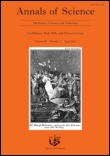
ANNALS OF SCIENCE
Illuminating the Historical and Philosophical Dimensions of ScienceANNALS OF SCIENCE, published by Taylor & Francis Ltd, is a pivotal journal in the field of the History and Philosophy of Science, as evidenced by its Q3 categorization and a respectable Scopus rank of 99 out of 223, placing it in the 55th percentile among its peers. With a rich history dating back to its initial publication in 1936, the journal has made significant contributions to scholarly discourse, providing a platform for researchers and academics to explore the intricate connections between scientific developments and philosophical inquiries. The journal's commitment to rigorous academic research ensures that it remains a vital resource for professionals, educators, and students dedicated to understanding the evolution of scientific thought. Although it operates under traditional subscription models, the journal's importance in shaping modern scientific discussions cannot be overstated, making it an essential read for those engaged in the multifaceted study of science's history and philosophical implications.
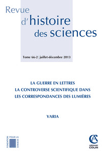
Revue d Histoire des Sciences
Illuminating the Past to Enrich the Future of Science.Revue d'Histoire des Sciences is a distinguished academic journal published by Armand Colin, focusing on the intricate interplay of history and philosophy within the sciences. Since its inception in 1973, the journal has served as a vital platform for researchers, scholars, and students interested in exploring the historical dimensions of scientific development. With an ISSN of 0151-4105 and an E-ISSN of 1969-6582, this journal is recognized within the academic community, achieving a modest 2023 Scopus ranking of Q3 in History and Philosophy of Science, positioning it within the 41st percentile of its category. The journal offers a prestigious space for rigorous discourse, critical analysis, and innovative research aimed at advancing our understanding of the scientific enterprise's past. While it operates under a traditional access model, the ongoing commitment to rich scholarly content ensures that the contributions will resonate with those dedicated to the intersections of history, science, and philosophy, providing insights into how historical context shapes scientific inquiry and advancement.
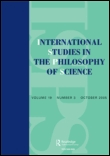
International Studies in the Philosophy of Science
Exploring the philosophical foundations of scientific inquiry.International Studies in the Philosophy of Science is a distinguished journal published by Routledge Journals, Taylor & Francis Ltd, dedicated to advancing scholarly dialogue in the intersecting realms of philosophy and science. With an ISSN of 0269-8595 and an E-ISSN of 1469-9281, this journal offers a carefully curated collection of research articles, reviews, and discussions that explore critical philosophical questions related to scientific methods, theories, and ethics. Although coverage for the journal in Scopus has been discontinued since 2017, it still maintains a respectable position with a rank of #75 out of 140 in the Arts and Humanities category, showcasing its relevance within the field. While it currently does not offer open access, the journal continues to be an essential resource for researchers, professionals, and students seeking to deepen their understanding of the philosophical underpinnings that inform scientific inquiry. By putting a spotlight on interdisciplinary approaches and fostering robust academic debate, International Studies in the Philosophy of Science plays a vital role in shaping the future discourse in the philosophy of science.

ERKENNTNIS
Pioneering rigorous discourse in philosophy and logic.ERKENNTNIS, published by SPRINGER, is a premier academic journal that has been advancing the study of philosophy and logic since its inception in 1919. With its esteemed ranking in the Q1 quartile for both categories as of 2023, it stands at the forefront of scholarly discourse, earning an impressive rank of #104 in the field of philosophy and #13 in logic according to the Scopus rankings. This influential publication not only contributes to the theoretical underpinnings of these disciplines but also fosters a vibrant exchange of ideas among researchers, professionals, and students alike. While it does not offer open access to its articles, the journal's esteemed reputation and rigorous peer-review process ensure that all published works maintain the highest standards of quality and intellectual inquiry, making ERKENNTNIS an essential resource for anyone engaged in these critical areas of study.

Pensando-Revista de Filosofia
Exploring the Depths of ThoughtPensando-Revista de Filosofia, an esteemed publication by UNIV FEDERAL PIAUI, EDITORA, serves as a vibrant platform for philosophical discourse and exploration, anchoring its significance within the field of philosophy. With the ISSN 2178-843X, this journal aims to promote critical thinking and disseminate innovative ideas that advance the study of philosophical theories, contemporary issues, and interdisciplinary approaches. Although it currently operates under non-open access terms, researchers and scholars can look forward to insightful articles that contribute to enriching the philosophical landscape. The journal is nestled in Bom Jesus, Piauí, Brazil, and welcomes submissions that engage with both traditional philosophical frameworks and contemporary dilemmas, encouraging a diverse array of perspectives. With a commitment to academic rigor and an aim to inspire both professionals and students alike, Pensando stands as a crucial resource for anyone eager to deepen their understanding of philosophy and its relevance in today's world.

Anales del Seminario de Historia de la Filosofia
Illuminating the Pathways of Philosophical InquiryAnales del Seminario de Historia de la Filosofia, published by UNIV COMPLUTENSE MADRID, SERVICIO PUBLICACIONES, is a distinguished open-access journal that has been contributing to the fields of History and Philosophy since 1980. With an ISSN of 0211-2337 and E-ISSN 1988-2564, it aims to provide a scholarly platform for the dissemination of original research and critical reviews pertinent to the historiography of philosophy and its influences on modern thought. The journal features a robust open-access model, ensuring that all published content is readily available to researchers, students, and professionals worldwide. The journal currently enjoys recognition within its field, classified within the Q3 quartile in History and Philosophy of Science and Q2 quartile in Philosophy as of 2023. Positioned within the heart of Spain, the journal facilitates international academic dialogue and invites submissions that explore the intersection of past philosophical contexts and contemporary issues. Whether you are a seasoned scholar or a budding philosopher, Anales del Seminario de Historia de la Filosofia aims to foster a deeper understanding of philosophical traditions and their ongoing relevance in today’s discourse.

Global Philosophy
Fostering Innovation in Global Philosophical DiscourseGlobal Philosophy, published by Springer, is a pioneering academic journal aimed at advancing the interdisciplinary dialogue within the field of philosophy on a global scale. With its dedicated ISSN 2948-1538 and E-ISSN 2948-152X, this journal provides a valuable platform for researchers and scholars to explore diverse philosophical traditions and contemporary issues affecting our interconnected world. As an Open Access publication, Global Philosophy ensures that cutting-edge research is readily accessible to a wide audience, fostering collaboration and innovation across disciplines. The journal encourages contributions that address both theoretical and practical implications of global philosophical inquiries, making it an essential resource for academics, professionals, and students committed to understanding the complexities of human thought in a global context. Engage with Global Philosophy and contribute to the evolving conversation on the myriad influences of global perspectives in philosophy.
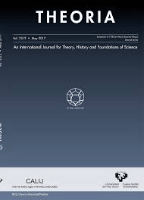
THEORIA-REVISTA DE TEORIA HISTORIA Y FUNDAMENTOS DE LA CIENCIA
Pioneering Insights in Philosophy and History of ScienceTHEORIA-REVISTA DE TEORIA HISTORIA Y FUNDAMENTOS DE LA CIENCIA, published by the Servicio Editorial Universidad del País Vasco, is a leading open access journal dedicated to advancing the fields of History, Philosophy of Science, and related disciplines since its inception in 2003. With a robust impact factor placing it in the esteemed Q1 and Q2 quartiles in its respective categories, this journal serves as a crucial platform for researchers, professionals, and students who are engaged in profound discussions and analyses of scientific foundations and historical contexts. Based in Spain, THEORIA has consistently demonstrated its commitment to scholarly excellence, achieving notable rankings in Scopus, particularly in the fields of Arts and Humanities, where it holds a rank of #169 in Philosophy and #59 in History and Philosophy of Science. The journal not only allows immediate open access to its diverse range of articles, fostering global knowledge dissemination, but also aims to bridge connections across varied philosophical inquiries and historical explorations within science. Join the dialogue today in shaping the future understanding of our scientific heritage.
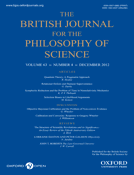
BRITISH JOURNAL FOR THE PHILOSOPHY OF SCIENCE
Elevating Academic Rigor in Philosophy of ScienceThe British Journal for the Philosophy of Science, published by University of Chicago Press, stands as a leading journal in the fields of philosophy and history of science. With its ISSN 0007-0882 and E-ISSN 1464-3537, this esteemed publication has been pivotal in advancing philosophical discussions surrounding scientific practice since its inception in 1950. Covering a diverse range of topics and critical analyses, it holds an impressive track record within the academic community, consistently achieving Q1 rankings across several categories, including History, Philosophy, and History and Philosophy of Science. With a Scopus rank placing it in the top percentiles of its respective fields, the journal is recognized not only for its academic rigor but also for its role in shaping contemporary philosophical discourse. While it is not an open-access journal, the British Journal for the Philosophy of Science provides essential insights and fosters critical thinking, making it an indispensable resource for researchers, professionals, and students dedicated to the nuanced interplay between science and philosophy.
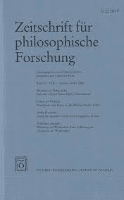
ZEITSCHRIFT FUR PHILOSOPHISCHE FORSCHUNG
Advancing Scholarly Discourse in Philosophy.ZEITSCHRIFT FUR PHILOSOPHISCHE FORSCHUNG is a prestigious academic journal published by Vittorio Klostermann GmbH in Germany, dedicated to the interdisciplinary field of philosophy. With its ISSN 0044-3301 and E-ISSN 1439-2615, this journal has made significant contributions to the philosophical discourse since its inception in 1977, continuing its pursuit of excellence in scholarship through 2024. Recognized in the 2023 category quartiles as Q2 in Philosophy, it is ranked #498 out of 806 in the Arts and Humanities' Philosophy classification by Scopus, placing it in the 38th percentile. Although it currently does not offer open access options, its rigorous peer-reviewed articles serve to enrich the scholarly community's understanding of complex philosophical issues. ZEITSCHRIFT FUR PHILOSOPHISCHE FORSCHUNG plays a vital role in advancing philosophical research in a collaborative academic environment, making it a valuable resource for researchers, professionals, and students alike.